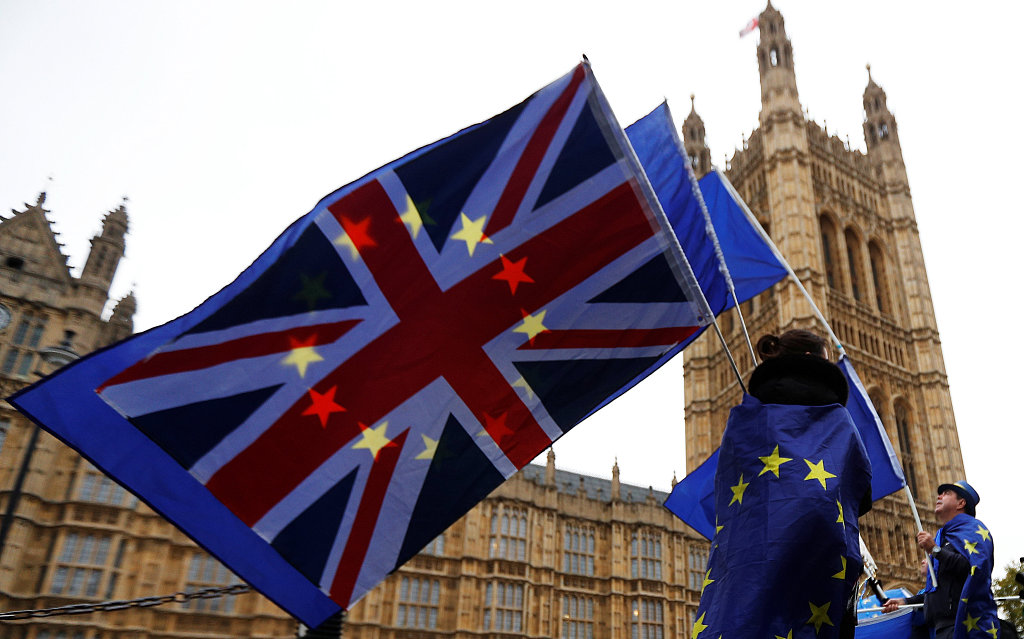
Anti-Brexit protesters wave EU and Union flags outside the Houses of Parliament in London, Britain, November 14, 2017. (File Photo: VCG)
The British government has undergone a historic defeat after members of parliament (MPs) overwhelmingly rejected the deal Prime Minister Theresa May brokered for leaving the European Union (EU).
The 432-202 vote with a wide margin of 230 has wiped out the efforts made in the tough Britain-EU negotiations for more than a year.
Moreover, a motion of no confidence tabled by main opposition Labor party leader Jeremy Corbyn has exerted more pressure on May's government and blurred the prospects of Brexit.
However "the show" ends, it is generally acknowledged that the Brexit disputes will undoubtedly damage the British economy, or even cause an economic collapse.
The "big show," in which different political forces on both sides of the English Channel and within Britain play against and quarrel with each other, dates back to June 2016, when the Brexit referendum took place. During the past two and a half years, Britain's economy has paid a high price.
As the show just began, the economy slid. Many experts believe that Brexit has ever since opened Pandora's box -- a plunge of the British pound, capital withdrawal, brain drains, job decline and deflation coming one after another.
The forecasts soon came true. Capital stood on the sidelines and business investment has suffered the most severe challenge since the 2008 financial crisis. Britain has lost a large number of talents. Financial institutions have been constantly transferring employees and assets to mainland Europe.
Now, the prospect of Brexit is still complicated and more confusing. As the British parliament Tuesday voted on the Brexit deal, the public were still discussing whether Brexit is a blessing or a curse.
A soft Brexit, a hard Brexit or no Brexit? It seems the MPs are playing the game of rock-paper-scissors, and no one has a clue who the winner will be.
An alternative Brexit deal is yet to be decided. Many experts predict that even an orderly Brexit will promise a receding economy this year, which is no better than the turbulent economy last year, and which will see economic stagnation or even negative economic growth, enterprises freezing their investments, and consumers delaying their spending plans in the first quarter.
A no-deal Brexit will lead to worse results. The Bank of England has warned of an economic downturn, an economic explosion, a weaker pound and property price collapse. Business leaders said taxes and costs will increase and companies will face a shortfall in parts supply.
No Brexit or a second Brexit referendum will make "the show" more dramatic, with uncertainties further inflicting heavy losses on the British economy.
A stable, open and developing Britain and EU are in line with the interest of all parties, and China hopes that the process of Brexit can be steady and orderly, Chinese Foreign Ministry spokesperson Hua Chunying said at a daily press briefing Wednesday.
What is at stake is the no-confidence vote May faces Wednesday, putting Britain's political scene at risk. If she survives the vote, May will still have a mountain to climb before solving the dilemma; if not, the ruling party and the prime minister will be changed and the person in charge of the process of Brexit becomes unclear.


